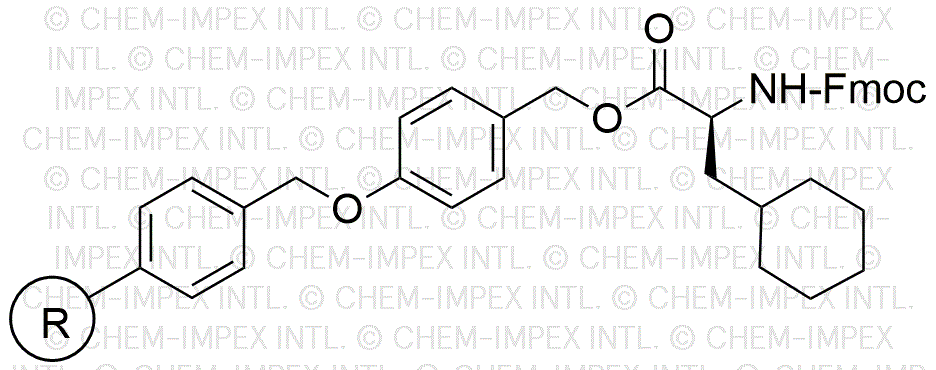Fmoc-3-cyclohexyl-L-alanine 4-alkoxybenzyl alcohol resin is widely utilized in research focused on:
- Peptide Synthesis: This resin serves as a solid support in the synthesis of peptides, allowing for efficient and high-yield production of complex molecules.
- Drug Development: It plays a critical role in developing new pharmaceuticals by facilitating the creation of peptide-based drugs, which can be tailored for specific therapeutic targets.
- Bioconjugation: The resin can be employed in bioconjugation processes, linking peptides to other biomolecules, enhancing the functionality of therapeutic agents.
- Analytical Chemistry: It is used in various analytical techniques, helping researchers analyze the structure and purity of synthesized peptides.
- Material Science: The unique properties of this resin make it suitable for developing new materials with specific chemical functionalities, beneficial in various industrial applications.
General Information
Properties
Safety and Regulations
Applications
Fmoc-3-cyclohexyl-L-alanine 4-alkoxybenzyl alcohol resin is widely utilized in research focused on:
- Peptide Synthesis: This resin serves as a solid support in the synthesis of peptides, allowing for efficient and high-yield production of complex molecules.
- Drug Development: It plays a critical role in developing new pharmaceuticals by facilitating the creation of peptide-based drugs, which can be tailored for specific therapeutic targets.
- Bioconjugation: The resin can be employed in bioconjugation processes, linking peptides to other biomolecules, enhancing the functionality of therapeutic agents.
- Analytical Chemistry: It is used in various analytical techniques, helping researchers analyze the structure and purity of synthesized peptides.
- Material Science: The unique properties of this resin make it suitable for developing new materials with specific chemical functionalities, beneficial in various industrial applications.
Documents
Safety Data Sheets (SDS)
The SDS provides comprehensive safety information on handling, storage, and disposal of the product.
Product Specification (PS)
The PS provides a comprehensive breakdown of the product’s properties, including chemical composition, physical state, purity, and storage requirements. It also details acceptable quality ranges and the product's intended applications.
Certificates of Analysis (COA)
Search for Certificates of Analysis (COA) by entering the products Lot Number. Lot and Batch Numbers can be found on a product’s label following the words ‘Lot’ or ‘Batch’.
Numéro de catalogue
Numéro de lot/série
Certificates Of Origin (COO)
This COO confirms the country where the product was manufactured, and also details the materials and components used in it and whether it is derived from natural, synthetic, or other specific sources. This certificate may be required for customs, trade, and regulatory compliance.
Numéro de catalogue
Numéro de lot/série
Safety Data Sheets (SDS)
The SDS provides comprehensive safety information on handling, storage, and disposal of the product.
DownloadProduct Specification (PS)
The PS provides a comprehensive breakdown of the product’s properties, including chemical composition, physical state, purity, and storage requirements. It also details acceptable quality ranges and the product's intended applications.
DownloadCertificates of Analysis (COA)
Search for Certificates of Analysis (COA) by entering the products Lot Number. Lot and Batch Numbers can be found on a product’s label following the words ‘Lot’ or ‘Batch’.
Numéro de catalogue
Numéro de lot/série
Certificates Of Origin (COO)
This COO confirms the country where the product was manufactured, and also details the materials and components used in it and whether it is derived from natural, synthetic, or other specific sources. This certificate may be required for customs, trade, and regulatory compliance.

